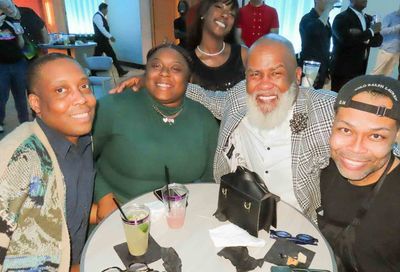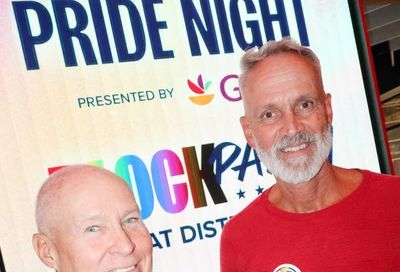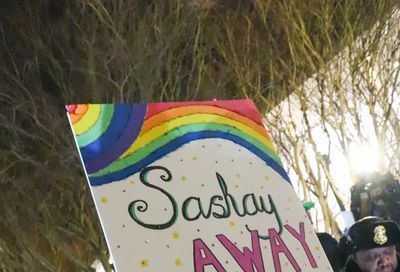Hate Talk
Forum looks at perceived spike in D.C. hate crimes
On the heels of what some perceived as a September spike in hate crimes — with an assault peppered with anti-gay epithets adjacent to the Georgetown University campus Sept. 9, a transgender woman assaulted near Gallery Place Sept. 13, and a gay man attacked in the Shaw neighborhood Sept. 22 — several local organizations, including D.C. Black Pride, the National Black Justice Coalition and the Mayor’s Office of LGBT Affairs, came together Tuesday night, Dec. 4, to present a forum on hate crimes and reducing violence.
”I’m not here to say I’m the victim of hate crime,” insisted Christian Jackson, 19, head of the Sexual Minority Youth Assistance League’s (SMYAL) Youth Leadership Council, who could point to an altercation at Union Station just a few days earlier, when he and friends from SMYAL were called ”faggots” by strangers. Jackson was one of seven panelists who addressed the crowd of about 50 people. ”We all have to stand up and fight.”
The other panelists were Sgt. Brett Parson, head of the Metropolitan Police Department’s (MPD) various ”special liaison units”; Rev. Abena McCray, pastor of Unity Fellowship Church of Washington, D.C.; Ronald Moten, co-founder of the local Peaceoholics community group; Alexander Robinson, head of the National Black Justice Coalition (NBJC); Gigi Thomas, of Helping Individual Prostitutes Survive (HIPS), Transgender Health Empowerment (THE) and the D.C. Trans Coalition; and José Guttierez, founder and president of the Latino GLBT History Project.
Among the observations of the situation on the street and suggestions for a better community response, Parson confirmed that D.C. bucks the national trend of race being the primary motivator in hate or bias crimes. ”In D.C., [being GLBT] is far and away No. 1.” Parson theorized, however, that the anomaly may be in part due to the local GLBT community being highly organized and visible, relative to other localities, and therefore more willing to report such crimes. He cautioned, however, ”the numbers, of course, are only numbers,” stressing that a perception of increased crime may be as damaging to a community as a genuine increase would be.
Other panelists Tuesday night, such as McCray, herself a lesbian and the victim of a horrific hate crime years ago, highlighted the good news at the forum, such as the support the community has received from the MPD’s Gay and Lesbian Liaison Unit. ”I want to give this Police Department one more hand.” Beyond that, she added that transgenders are disproportionately the victims of violent crimes, saying the community might want to look inside its collective self to being to combat that unfortunate reality: ”There is even some hate within the GLB for the T.”
Altogether, with no recent headlines of attacks on the GLBT community, the mood at Tuesday’s forum — held in the Kennedy Recreation Center’s gymnasium at Seventh and O Streets NW, just blocks from one of the September attacks — was calm, constructive and collaborative. That last component, the collaboration, was stressed as a way to possibly reduce hate crimes in the District, by showing that community organizations of every kind all stand together against hate crimes. Tuesday night, however, only Moten of Peaceoholics represented a group not directly tied to the GLBT community. On the other hand, strained relations between the GLBT community and segments of the city’s church community were pointed to as a probable source for anti-GLBT bias in the District.
Still, McCray, who as a pastor offered the most insight into those strained community relations, seemed both optimistic and realistic about how this conversation may evolve if community interest remains.
”There’s a big problem, and it starts in the pulpit,” she said in response to an attendees observation about religious leaders moving to block hate-crime laws that include GLBT people. ”We may never stop hate, but we can stop criminal actions against people.”
Support Metro Weekly’s Journalism
These are challenging times for news organizations. And yet it’s crucial we stay active and provide vital resources and information to both our local readers and the world. So won’t you please take a moment and consider supporting Metro Weekly with a membership? For as little as $5 a month, you can help ensure Metro Weekly magazine and MetroWeekly.com remain free, viable resources as we provide the best, most diverse, culturally-resonant LGBTQ coverage in both the D.C. region and around the world. Memberships come with exclusive perks and discounts, your own personal digital delivery of each week’s magazine (and an archive), access to our Member's Lounge when it launches this fall, and exclusive members-only items like Metro Weekly Membership Mugs and Tote Bags! Check out all our membership levels here and please join us today!



















